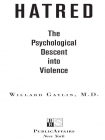Hatred, Willard Gaylin [best ebook for manga txt] 📗

- Author: Willard Gaylin
Book online «Hatred, Willard Gaylin [best ebook for manga txt] 📗». Author Willard Gaylin
The Nazis found the most effective means of dehumanizing: The Jew would be viewed not just as an animal, but as the lowest form, a parasite. People may romanticize dogs, but no one finds affection for a tubercle bacillus or a smallpox virus. The Jews, who started out as well poisoners—spreaders of disease—now became the disease itself. Hitler, himself, had introduced the idea of the Jew as parasite in Mein Kampf, where the analogy is used throughout. Nazi publications characteristically referred to the Jew as bacteria, scum, tuberculosis, cancer, maggots, and viruses.
In his diary for March 27, 1942, Joseph Goebbels wrote: “The Jews will destroy us if we do not defend ourselves against them. This is a war of life or death between the Aryan race and the Jewish virus.”73
This statement encapsulates almost all the elements that are central to the definition of a paranoid state: (1) It differentiates an us from a them, defining two alternative cultures. (2) It defines the “other” as an enemy. We are obsessed with the enemy who now becomes part of our daily life. (3) It identifies a life-threatening situation, thereby justifying eradication of the enemy as an act of self-defense. (4) It dehumanizes the enemy, identifying him as a virus, thereby denying him his right to the normal protections accorded “our fellow men.” We may respond with satisfaction at the sight of the piled corpses accumulated in the killing fields as a job well done, as an exterminator would respond at a mound of destroyed rats in a garbage dump, as many in the Arab world delight at viewing the results of a suicide bombing.
The sheer intensity and murderous rage of the Nazis eventually transcended all rationalization, taking antisemitism to an extreme and insane end. Robert Wistrich labeled the Nazi hatred of the Jews as a singularly irrational event even in the irrational world of bigotry. What made it remarkable to him was the fact that the Nazis’ pathological pursuit of the Jews was independent of Jewish actions or belief:
Nazi racism sought to annihilate Jews not for what they did, for their faith, their customs, or political opinions, but for what they were alleged to be, for their very being. The fatality of birth condemned Jews to death, every Jew and all Jews, everywhere and always. They were the counter-type, the paradigmatic “other” race inassimilable by definition, inclassable [sic], outside the natural hierarchy of races, beyond the human pale. Not even a race, strictly speaking (since they were “unnatural”), perverse, demonic, the intrinsically evil “other”—in a word, the Jews were the Devil incarnate in human form. Their extermination—in the worldview of Nazi zoological racism—was the prerequisite not simply to secure German race-purity and “Aryan” hegemony, but ultimately the happiness of all mankind.74
The insane hatred of the Jews by Hitler and his henchmen was rooted in their individual pathologies, but to accomplish their goals, they required the cooperation of the majority of an entire nation. The intensity of hatred necessary to mobilize that population in support of the Holocaust could not be based on historic data. It had to be in the here and now. It was the job of the psychopathic and psychotic Nazi leadership to supply rational reasons to the population, which was not itself preponderantly composed of psychotic members, in order to gain the people’s cooperation for what objectively can be only viewed as an insane obsession. The Nazi propagandists justified the genocide of the Jews by equating it as we treat our “war on cancer” or, more accurately, our successful campaigns to eliminate smallpox and poliomyelitis. To succeed, to protect the future of their children, they had to destroy the virus to the very last presence on earth. This was to be a universal genocide.
Daniel Goldhagen, while acknowledging that the Nazi leaders represented a degree of pathology unparalleled in modern history, held that the German people were particularly receptive to adoption of so paranoid a view of the Jews. Even before the rise of the Nazis, he claimed, the German people were possessed of a particularly virulent form of antisemitism; they viewed the Jews as biologically different, a race apart. Since, according to the Germans, the Jewish characteristics that they perceived were rooted in genetics, as distinguished from culture, the Jews’ evil ways were immutable. Worse, they could be transmitted through generations, and transmitted to purer races. The Jews, all Jews, had to be destroyed. It was a matter of survival for the German people; the Holocaust was an act of self-defense.75
There is a certain reassurance in feeling that a culture of hatred requires such special conditions as Goldhagen outlined: (1) a ruthless and mad leadership; (2) seizing power in a geomilitary situation specific to Germany; and (3) acting out on a particularly susceptible population, the German people. One can take comfort in this hypothesis. It makes the possibility of a recurrence of a horror like the Holocaust that much less likely.
While I remain admiring of Goldhagen’s understanding of the mechanisms of hatred, I do not think he made the case that Nazism could only have been a German phenomenon. I am not convinced that the Germans were more virulently antisemitic than the Poles, the Lithuanians, the Ukrainians, or the French, for that matter. Jedwabne certainly indicates the capacity of the Poles to treat Jews as disposable scum. And while much has been made of the danger posed by the eugenics movement that swept Germany in the 1920s, eugenics was taken seriously in most of the Western world—in the United States particularly—without leading to political policies of racial engineering, let alone genocide. “Genetic engineering,” when discussed in the United States, is limited to the context of medical cures or improvement of agricultural products, not in the preservation of





Comments (0)